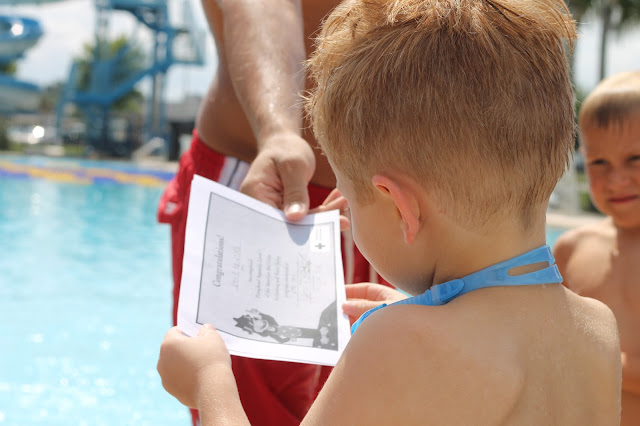We hit our local library sale hard the other day--we took the "everything you can fit into a paper bag for $10" as a personal challenge and there was much arranging and rearranging to shove in just one more book as well as discussion about how much could be sticking out before we would be stopped at the door by the library police (i.e. the sweet old ladies at the checkout).
I like to think of a library seconds sale more of a book rescue mission than a book sale. Libraries are always "withdrawing" the best books to replace them with goodness knows what twaddle--especially when it comes to old children's books. We had some major saves--even coming on the last day of the sale. Care to see a sampling?
So, I like to read....sometimes to the detriment of the children....and I do occasionally look longingly to some undetermined time in the future when I can just sit and read a book as the boys play contentedly nearby without need of their current......umm....
level of supervision.
In fact, I enjoy reading so much that I've recently taken to reading books about reading books.
I scandalized a local seven year old by bringing my copy of
How to Read a Book* to the park. He looked at the cover, looked at me and then walked off mumbling something under his breath that sounded a lot like
she doesn't know how to read a book? I thought about chasing him down to defend my honor and calmly explaining that clearly if I'm reading a book
about how to read a book then I must in fact already know how to
read but I restrained myself.
It has pretty much my favorite opening ever:
"This is a book for readers and for those who wish to become readers. Particularly, it is for readers of books. Even more particularly, it is for those whose main purpose in reading books is to gain increased understanding.
By "readers" we mean people who are still accustomed, as almost every literate and intelligent person used to be, to gain a large share of their information about and their understanding of the world from the written word. Not all of it, or course; even in the days before radio and television, a certain amount of information and understanding was acquired through spoken words and through observation. But for intelligent and curious people that was never enough. They knew that they had to read too, and read they did.
There is some feeling nowadays that reading is not as necessary as it once was. Radio and especially television have taken over many of the functions once served by print, just as photography has taken over functions once served by painting and other graphic arts. Admittedly, television serves some of these functions extremely well; the visual communication of news events, for example, has enormous impact. The ability of radio to give us information while we are engaged in doing other things--for instance, driving a car--is remarkable, and a great saving of time. But it may be seriously questioned whether the advent of modern communications media has much enhanced our understanding of the world in which we live.
Perhaps we know more about the world than we used to, and insofar as knowledge is prerequisite to understanding, that is all to the good. But knowledge is not as much a prerequisite to understanding as is commonly supposed. We do not have to know everything about something in order to understand it; too many facts are often as much of an obstacle to understanding as to few. There is a sense in which we moderns are inundated with facts to the detriment of understanding.
One of the reasons for this situation is that the very media we have mentioned are so designed as to make thinking seem unnecessary (though this is only an appearance). The packing of intellectual positions and views is one of the most active enterprises of some of the best minds of our day. The viewer of television, the listener to radio, the reader of magazines, is presented with a whole complex of elements--all the way from ingenious rhetoric to carefully selected data and statistics--to make it easy for him to "make up his own mind" with the minimum of difficulty and effort. But the packaging is often done so effectively that the viewer, listener, or reader does not make up his own mind at all. Instead, he inserts a packaged opinion into his mind, somewhat like inserting a cassette into a cassette player. He then pushes a button and "plays back" the opinion whenever it seems appropriate to do so. He has performed acceptably without having had to think."

And as a book defacer I also enjoyed this part:
"When you buy a book, you establish a property right in it, just as you do in clothes or furniture when you buy and pay for them. But the act of purchase is actually only the prelude to possession in the case of a book. Full ownership of a book only comes when you have made it a part of yourself, and the best way to make it a part of yourself--which comes to the same thing--is by writing in it.....Marking a book is literally an expression of your differences or your agreements with the author. It is the highest respect you can pay him."
With all of my extra free time I've managed to start up two different book clubs here--a regular one and a Catholic mom one :) We're reading
Middlemarch** and
Strange Gods respectively and I'm so excited to be able to read a good book and have someone to discuss it with. Chris is probably also excited at the potential decrease in the times he hears "hey, listen to this!" followed by me reading huge sections of my current book aloud to him. Okay that probably won't
actually decrease--but,
maybe he likes it?
These book clubs fit nicely with the fact that I generally have multiple books going at once....usually a novel,a non-fiction (mostly of the parenting/homeschooling variety these days) and also some kind of spiritual reading. That way I've got options based on my mood and/or the children's noise level.
Reading is important.
That you read is important.
What you read is important:
"Books help to form us. If you cut me open will you find volume after volume, page after page, the contents of every one I have ever read, somehow transmuted and transformed into me?...What a strange person I must be. But if the books I have read have helped to form me, then probably nobody else who ever lived has read exactly the same books, all the same books and only the same books, as me. So just as my genes and the soul within me make me uniquely me, so I am the unique sum of the books I have read. I am my literary DNA."
~Howards End Is on the Landing: A Year of Reading from Home
Now, I can almost hear you clamoring,
"No Cristina, don't end this post yet! I could go on reading about these things that I'm only mildly interested in and to which you have added almost no pictures of your precious children which are the only reason I read this to begin with!" Well you are in luck my friends! I don't have any cute pictures but I will leave you with some (much more) interesting thoughts than my own on the importance of reading and of
not reading:
Dog-Eared Pursuits by Anthony Esolen
Liberate Yourself From E-Slavery by Christopher Check
Great Books, Higher Education, and the Logos by Michael M. Jordan
If anyone has time left to read through any of them I would love to hear your thoughts!
PS Chris would like me to announce to the world that in a mere six months of reading in ten minute increments before bed, we have managed to finish reading
The Lord of the Rings aloud to each other--which is either precious or lame....I'll let you be the judge :)
PPS
Andrew Henry's Meadow (as seen above) is my new favorite children's book for little boys who love to tinker :)
*Thanks Mr. Steve!
**I just got my copy of Middlemarch and I had no idea it was so long! Apparently I pretty much went up to my friends and said the equivalent of, "I know what would be fun, let's read War and Peace this summer!" Sorry ladies :)








-001.JPG)




























